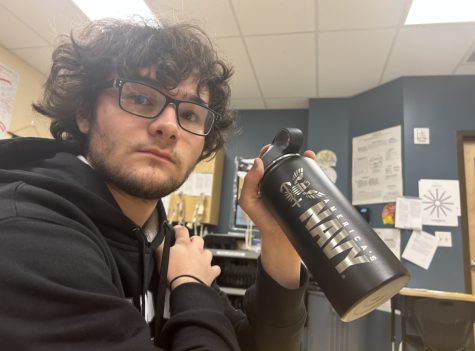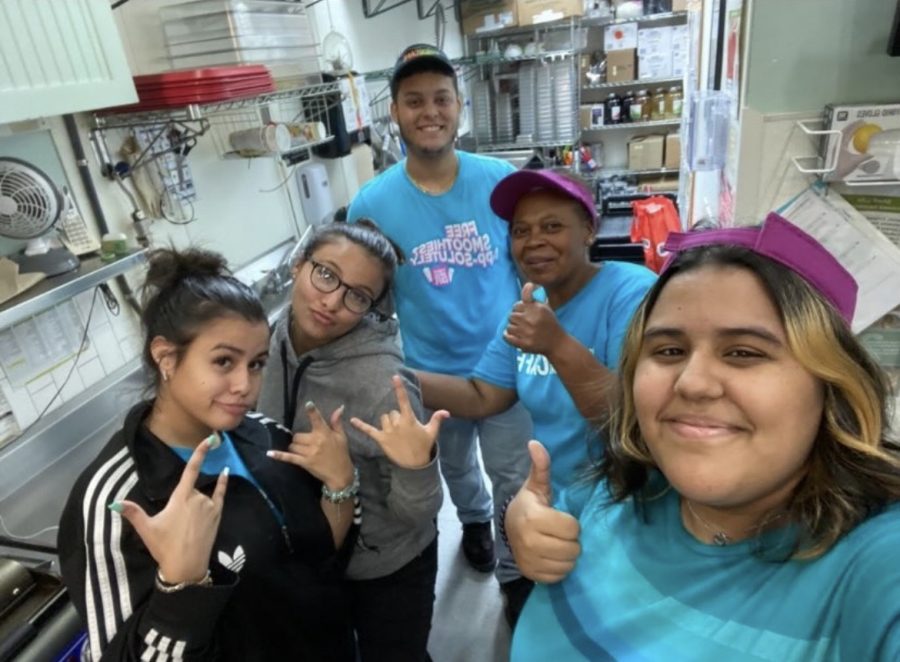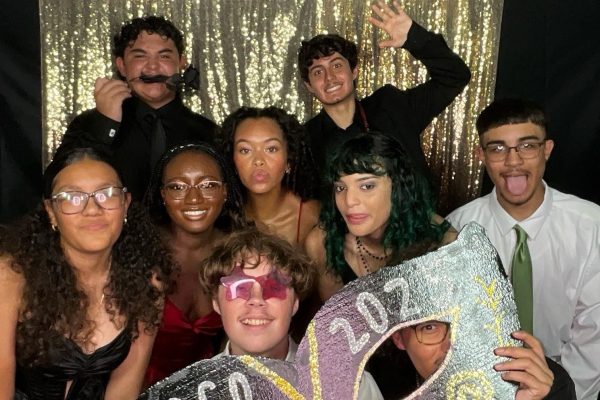Taking A Different Path
Students Opting Out of University
Senior Liznel Ortega plans to work at Tropical Smoothie during her gap year.
Often students face pressure to go directly from high school to university, but there are plenty of students choosing to delay college or explore other options.
One such student is Senior Ryan Briese, who intends to join the U.S. Navy right out of high school. Although it took him some time to settle on a career, his decision was not one made lightly, nor was it without any prior connection to the armed forces.
“My family is kind of a military family, my father was a Marine, and so I was kind of, from the start, like maybe I should join the military,” Briese shared. “Especially, because it gives me a better chance of getting scholarships, and getting free college and a ton of other benefits.”
As Briese does not graduate until May of 2023, he still has a lot of time before actually enlisting. While many other teens write their college applications, Briese takes his own steps towards post high school success, by retaking the Armed Services Vocational Aptitude Battery Test (ASVAB).

“I’m gonna take it again this year, because I’m trying to get a higher grade, the better you do, the more jobs you get offered and the better you do, the higher paying jobs you get,” Briese said.
Specifically, he is trying to improve his biology and math scores, to try to work with computers or medicine in the Navy. After he took the ASVAB last year, he was initially contacted by recruiters. Getting in touch with recruiters, he explained, is a crucial step for those wanting to join the military. This contact was what solidified his decision to join the Navy over other branches of the military.
“You’ll go to like four different places you can get you have a chance to get stationed overseas, and kind of what I want to do is like get stationed overseas to see more of the world,” Briese explained. “So that was kind of one of the big things that drew me into joining the Navy.”
Additionally, he felt that the Navy offered him career choices that were both better suited to his interests and offered more opportunities for his future. He plans to stay in the Navy for about eight years, before heading to college. However, he does not feel that college is necessary or suitable for everyone.
“I believe at least in our generation college isn’t necessarily for everyone, because a lot of people get out of high school and they’re like ‘Man, high school was draining. I don’t want to do this.’ I do believe that college isn’t necessarily for everyone, since it is kind of a lot of work and a lot of pressure to do and it costs a lot of money,” Briese said.
Other students, such as Senior Liznel Ortega, plan to go to college after a “gap year”. This refers to a year between high school and college, often used to save money, have fun, and prepare for university.
“Well, I was thinking of working for like a year to be a break. Because after doing school for like, a long time, you know, it gets draining,” Ortega shared. “So I just want to recharge. But I might be doing Valencia for like two years and then go on to what I want to do.”
Valencia College – a local community college- would offer Ortega far more flexibility regarding her coursework. Currently she is enjoying working at Tropical Smoothie and plans to stay there and save after graduation.
“You can make money to save money for college and to not have as much student debt as (some) people have. (check end of quote)” Ortega explained.
So far she has found her working environment at Tropical Smoothie to be a positive one, with coworkers she gets along with and an opportunity to take a break before jumping into college.
“It’s a good work environment. We always get those certain people like the ‘Karens’ like you want to call it,” Ortega said. “But other than that, I love the staff. I love everyone there. Like it’s a good place to start if you’re looking for a job.”
Like many students across the United States, Ortega sometimes struggles with social anxiety and exhaustion from high school, which led her to conclude that a gap year might be rejuvenating.
“I feel like that was a big part of my decision. Because you know, anxiety, you can’t really control it at times,” Ortega said. “And I know if I’m, like, around a big group of people, I will start getting anxious and all that stuff.”
Ortega is not entirely sure what she wants her future to look like beyond her gap year, while she is fairly certain about attending Valencia college, what she will study is still something she is exploring. She has a few careers in mind.
“I have three in mind. I’m not sure what to do yet. I have either veterinarian, sign language (as) like a translator, or a therapist,” Ortega shared.
Senior Joshua Burgess has decided to attend trade school, since that is what he feels is most conducive to his learning style. He hopes to learn about automotive mechanics or carpentry.
“It’s more interactive, because that’s how I like to learn. I learned a lot better when I’m actually interacting with what I’m doing, instead of just sitting there reading a book,” Burgess shared.
Trade school can be an excellent option for students that want to learn a specific skill. Burgess’ primary motivation for wanting to attend trade school, though, is his family’s experience with trade school.
“I’ve also kind of grown up in the family with all the trades. And I was like, I don’t want to be in a lot of student loan debt and have to deal with that,” Burgess said. “I don’t like sitting through lectures and all that in college. So I decided I’ll do something more interactive, and try to do something that will also be sustainable in the future.”
People who completed trade school often walk away with very directly transferable skills and clear pathways to steady careers. Trade school is often less expensive than college as well. While Burgess’ trade school decision is not solely financially motivated, he explained some issues he sees with the price of college.
“It’s because it’s so expensive to actually learn to do something that a lot of these higher paying jobs and higher qualifying jobs, people don’t want to do, because it costs so much that they spend half their life trying to get back on their feet,” Burgess said.
Beyond the two areas of study that Burgess is currently considering, he can see himself pursuing trade school in another subject too. He hopes that gaining additional qualifications can help him gain reliable employment, even as some skills become less relevant.
“For example, you do air conditioning, or you do carpentry, sometimes people need their ACs fixed but then other times, it’s not that time of the season,” Burgess explained. “You can’t really get any, you know, any jobs, you have to find something else to do. So another education on top of that one helps a lot.”
Burgess pointed out that trade school can be a great option for people that are not interested in going to college and that more people ought to consider it in the future. He has also seen that a sizable portion of his peers are considering alternatives to college as well.
“I think they should, because it’s better than having nothing is better than going off to, you know, go work at a fast food place,” Burgess said. “It’s also not as expensive so it’d be a lot cheaper for them to actually go into instead of college like right off the bat.”
Your donation will support the student journalists of Four Corners Upper School. Your contribution will allow us to purchase equipment and cover our annual website hosting costs.

Kate Stout is a senior and this is her fourth year on staff. She joined journalism to expand her writing and editing skills. In the future, she would like...







